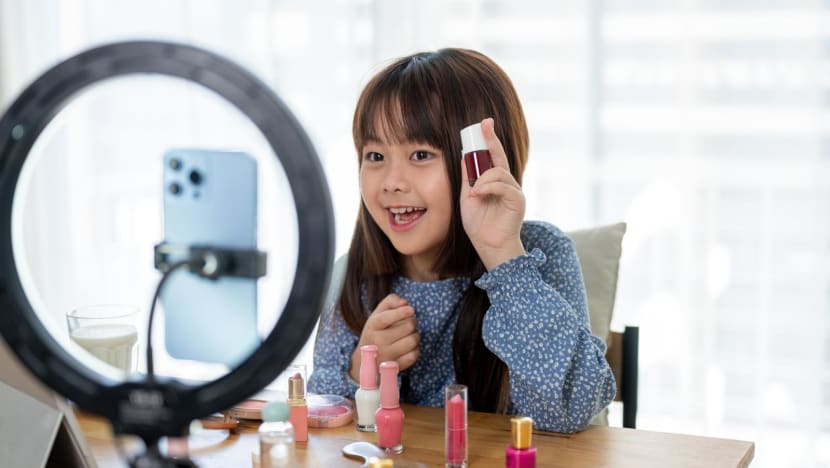How young is too young for skincare? Children in the US promote products on social media
Observers say social media is to blame for the worrying trend.


This audio is generated by an AI tool.
WASHINGTON: Skincare brands are seeing a surge in sales from their youngest customers in the United States, with children as young as seven using expensive products meant for adult skin.
Observers said social media is to blame for the worrying trend.
Last year, teen shoppers in the US spent 19 per cent more on skincare than the previous year, according to investment bank Piper Sandler.
INGREDIENTS THAT COULD HARM YOUNG SKIN
Dermatologists told CNA that in most cases, skincare products are an unnecessary expense for children.
They cautioned that some products contain ingredients that can harm young skin.
Dr Elizabeth Houshmand, a board certified dermatologist, recalled a nine-year-old girl who sought help for a rash that developed on her face after using a skincare cream.
“The issue was that she didn't go buy this by herself. She did go with her mum,” she said.
“The packaging is beautiful (with) bright colours (and) lovely packaging, and they thought it was a moisturiser.”
Unfortunately, that moisturiser had glycolic acid, an alpha-hydroxy acid that helps reduce fine lines and wrinkles, among other things.
“(This is) wonderful for the appropriate person, but not for a nine-year-old,” said Dr Houshmand.
Social media influencer Adrea Garza, the mother of seven-year-old twin influencers Koti and Haven, said the girls have never used anything with these potent active ingredients.
“Most of the mainstream media has dubbed this generation as Sephora kids and portrayed this skincare trend as dangerous, with a focus on beauty and a worry that young girls are starting to care about how they look younger and younger,” she noted.
“But what if we changed the conversation and started to look at it through a lens of opportunity, and opportunity to teach our young girls about self-care and self-love?”
NO NEED FOR KIDS TO HAVE ELABORATE SKINCARE ROUTINES
While dermatologists welcome the interest in caring for the skin, they say there is no need for multiple-step routines.
“As a parent, and a paediatric dermatologist, I don't think there's any need or even role for elaborate skincare regimens for young children,” said Dr Yasmine Kirkorian, chief of dermatology at Children's National Hospital.
“Definitely, I think that's something that's a trend and that is not supported by any evidence.”
Skincare brand Drunk Elephant, which sells its moisturiser for nearly US$70, is one of the most popular brands among young shoppers. The company has had to advise them to stay away from some of their products.
In California, some state legislators have tried to push for further action.
Mr Alex Lee, member of the California State Assembly, said: “I’ve introduced this Bill to ban the sale of anti-aging products to kids and preteens.”
However, the law has failed to advance. Nationally, there are no age restrictions on who can buy these products.
Marketing professor Sonya Grier, who spent two years working at the Federal Trade Commission, said the agency - which works to prevent fraudulent and unfair business practices - looks at whether there is truth in advertising.
“You don't want to have miscommunication or untruths, and that doesn't focus specifically on skincare. So that falls through the crack in that way,” said Prof Grier from the American University’s marketing department.
“You have regulations that focus on youth such as COPPA, the Children's Online Privacy Protection Act, and that regulates what type of information can be collected from youth. So again, that focuses on youth, but it doesn't focus on skincare.”
SOCIAL MEDIA INFLUENCING CHOICES OF THE YOUNG
Estimates suggest the global skincare market could reach US$167 billion in sales by 2030.
“If you can get younger and younger children on it, you are creating a lifetime customer,” said Prof Grier.
“And so that's what brands want to do. So they use social media, which is where youth are, as a way to interest them in these products.”
Nearly one in three teens said they are on YouTube or TikTok several times daily, according to a recent poll by American think tank Pew Research Center.
With social media flooded with skincare videos, it will be difficult for young people to make an informed choice, said observers.
“There are people like me arguing for a critical understanding of marketing. So marketing literacy for kids in particular, because what's happening in skincare is also happening in food marketing,” said Prof Grier.
“To develop a generation of responsible consumers, companies, parents, educators, everyone has to think about how we create responsible consumers.”


















